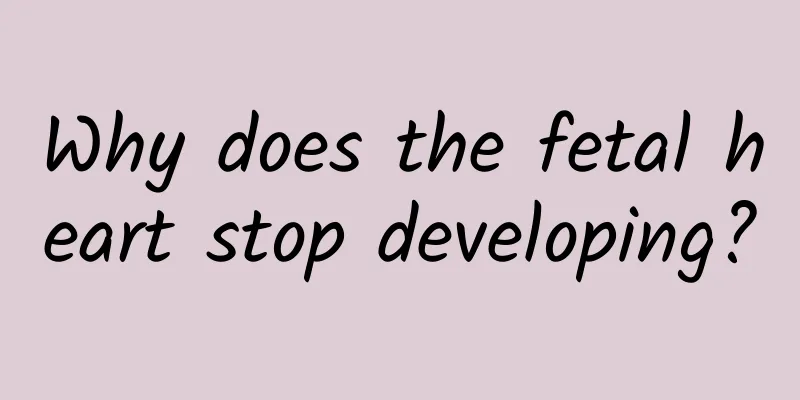Why does the fetal heart stop developing?

|
Generally speaking, if a pregnant mother is pregnant, she can welcome the arrival of her baby after ten months. However, some women will experience symptoms of fetal heart arrest in the early stages of pregnancy due to improper physical conditioning or other reasons, losing the chance to become a mother and losing their children. This is undoubtedly a huge blow to them and will cause them psychological harm. But through conditioning treatment, this situation can be avoided. But why does the fetal heart stop developing? (1) Reason 1: Endocrine disorders in expectant mothers When it comes to the reason why the fetal heart stops developing, the embryo continues to develop after implanting in the uterus. This process relies on an extremely complex endocrine system in the mother's body. The three important hormones, estrogen secretion, progesterone secretion, and human chorionic gonadotropin, need to be coordinated with each other. Once any link is abnormal, it may lead to fetal heart arrest and miscarriage. Early embryonic development requires three important hormones to maintain a certain level: estrogen, progesterone and human chorionic gonadotropin. If the mother's hormones are insufficient to meet the needs of embryonic development, it may cause embryonic arrest. Common progesterone (less than 20), thyroid-stimulating hormone TSH (increased to above 2.5), increased prolactin, and doubling of HCG are not good. (2) Reason 2: Chromosomal abnormality Among the causes of fetal heart arrest, chromosomal abnormality is also a very common and typical cause. Chromosomal abnormalities include abnormalities in chromosome number and structure. Whether the chromosome number is aneuploid or polyploid, or the structure is abnormal or missing, it will cause embryonic heart arrest, fetal miscarriage, deformity, etc. In order to avoid adverse fetal delivery, expectant mothers need to pay attention to prenatal diagnosis. (3) Reason 3: Reproductive tract infection of expectant mothers We know that after a pregnant woman becomes pregnant, her hormone levels will change significantly, and her body resistance will also decrease during this process. If the mother is infected with pathogens, especially a reproductive tract infection, these pathogens may infect the placenta through the bloodstream, eventually destroying the placental barrier, leading to a series of serious consequences such as embryonic development cessation and fetal miscarriage. In order to avoid terrible consequences, expectant mothers must be careful during pregnancy to avoid these risks. (4) Reason 4: Immune factors Including mothers with autoimmune diseases and reproductive immune abnormalities, positive anti-sperm antibodies, anti-cardiolipin antibodies, and anti-endometrial antibodies, which may lead to fetal arrest. (5) Reason 5: Infection Severe TORCH infection in early pregnancy may cause fetal arrest. Mycoplasma infection, husband's sperm density and motility are low. |
<<: What are the symptoms if the fetus stops growing?
>>: What is gynecological cytology?
Recommend
Cerebral arteriosclerosis, prevention is effective
Cerebral arteriosclerosis is a local manifestatio...
The best thing to absorb formaldehyde
Formaldehyde is a toxic substance. It often appea...
Can I take a shower after a cervical biopsy?
Cervical biopsy is a way to examine the cervix. B...
How to treat facial depression
In this age of appearance justice, face is someth...
The efficacy and function of Schefflera chinensis
Schefflera arborvitae, also known as Schefflera a...
What are the effects and functions of golden cherry?
Rosa rugosa, also known as sea buckthorn, is quit...
What is sulfuric acid paper?
Sulfuric acid paper is also called platemaking su...
What are some aphrodisiac teas? Drinking these four is the most effective
For male friends, if they want to enhance their s...
Sweating in six areas is the most dangerous
Sweating on the forehead - Hyperactivity of liver...
What does the length of the middle finger mean? Different fingers represent different personalities
In life, if people observe the length of fingers,...
TCM treatment of gastric disease, these Chinese medicines should be known
Stomach problems are mainly caused by improper di...
What are the causes of spleen deficiency, dampness and heat? Is there any relationship between spleen deficiency, dampness and heat and acne?
Spleen deficiency and dampness-heat is a relative...
How long can you live with bilateral polycystic kidney disease?
Bilateral polycystic kidney disease is a type of ...
How to regulate heavy cardiac afterload?
The load on the heart is divided into preload and...
Early symptoms of dry socket
Many people don't have a particularly good un...









